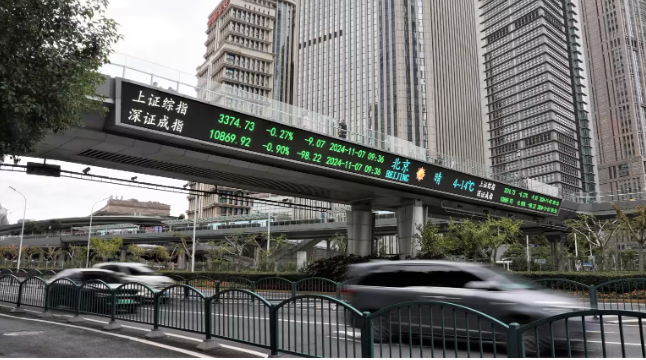Chinese stock markets showed divergent trends on Monday as investors reacted to the latest economic measures introduced by Beijing and concerns surrounding the potential return of Donald Trump to the White House. Hong Kong's Hang Seng Index dropped by 1.45%, with notable declines in consumer, financial, and property sectors. Companies such as China Resources Beer Holdings and Hong Kong Exchanges and Clearing saw significant losses, with shares falling by 4.62% and 3.95%, respectively. The property sector also faced pressure, with China Longfor Properties dropping 5.1%.
In contrast, mainland China stocks showed modest gains, with the CSI 300 index, which tracks major companies listed in Shanghai and Shenzhen, closing 0.66% higher. This rally was driven primarily by a surge in chip stocks, including semiconductor equipment maker Advanced Micro-Fabrication Equipment, which rose 12.9%, and Unisplendour, a cloud computing company, which saw an 8.4% increase. Several other chip stocks on the STAR market, including Nexchip, also hit their daily trading limit.
The market's mixed performance came amid investor disappointment over China's latest stimulus package, which failed to meet expectations. The government’s recent 10 trillion yuan ($1.4 trillion) debt swap program aimed at addressing local government debt issues fell short of delivering the direct consumption and property sector support that many had anticipated. This lack of targeted stimulus for households, which had been hinted at in earlier discussions, further dampened market sentiment.
Barclays economists, in a note on Friday, downgraded their growth forecast for China’s GDP in 2025 to 4%, citing the uncertainty surrounding U.S. tariffs and the political landscape under Trump’s potential re-election. The delay in tariff hikes until the new administration is in place adds to the unpredictability, with economists warning that China’s export growth will heavily depend on the direction of U.S. trade policy.
In addition to the stimulus disappointment, concerns over Trump’s re-election and the potential impact of his policies on global trade and geopolitics have weighed heavily on investor sentiment. Nomura’s Asia-Pacific equity strategist, Chetan Seth, highlighted that Trump’s return to the White House, along with the possibility of Republicans controlling both the Senate and House, could continue to exert pressure on Chinese markets in the near term.
The weakening of the Chinese yuan further reflects the uncertainty surrounding the economic outlook. The People's Bank of China set the midpoint for the onshore yuan at 7.1786, its weakest level in a year, and the currency continued to depreciate, falling to 7.1892 against the dollar by afternoon trading. The offshore yuan was largely unchanged at around 7.2063 per dollar.
Deflationary pressure remains a significant concern for the Chinese economy, as evidenced by the 10-year China government bond yield, which dropped to 2.1067% on Friday, the lowest since late September. The ongoing deflationary trend adds to the challenges faced by policymakers as they attempt to stabilize the economy amid domestic and international uncertainties.
Overall, the markets are continuing to grapple with the mixed signals from Beijing’s economic policies, the unresolved geopolitical tensions under Trump’s potential re-election, and the broader structural challenges within the Chinese economy.





